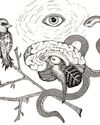
Received wisdom says that the philosophical projects of Nietzsche and Plato are about as diametrically opposite as any two philosophical projects can be. This impression is not without justification. Plato is the
philosopher of otherworldly order who argued that our senses do not reveal any valuable or fundamental truths. Nietzsche is a selfproclaimed inverter of Platonic philosophy, denying and damning all that is eternal, perfect, and transcendent. However, an overlooked parallel between Nietzsche and Plato in their aesthetic ideas shows they have some unexpected common ground. Specifically, they both attack broad classes of art, arguing that such art is socially problematic. The problem for both of them is that art can negatively affect the development of higher types of people.
“But wait,” you might already be saying, “I can remember Plato’s anti-art attitude; but isn’t Nietzsche a proponent of art, even at times holding it above his often beloved science?”
This story is from the {{IssueName}} edition of {{MagazineName}}.
Start your 7-day Magzter GOLD free trial to access thousands of curated premium stories, and 9,000+ magazines and newspapers.
Already a subscriber ? Sign In
This story is from the {{IssueName}} edition of {{MagazineName}}.
Start your 7-day Magzter GOLD free trial to access thousands of curated premium stories, and 9,000+ magazines and newspapers.
Already a subscriber? Sign In

Anselm (1033-1109)
Martin Jenkins recalls the being of the creator of the ontological argument.

Is Brillo Box an Illustration?
Thomas E. Wartenberg uses Warhol's work to illustrate his theory of illustration.

Why is Freedom So Important To Us?
John Shand explains why free will is basic to humanity.

The Funnel of Righteousness
Peter Worley tells us how to be right, righter, rightest.

We're as Smart as the Universe Gets
James Miles argues, among other things, that E.T. will be like Kim Kardashian, and that the real threat of advanced AI has been misunderstood.

Managing the Mind
Roger Haines contemplates how we consciously manage our minds.

lain McGilchrist's Naturalized Metaphysics
Rogério Severo looks at the brain to see the world anew.

Love & Metaphysics
Peter Graarup Westergaard explains why love is never just physical, with the aid of Donald Davidson's anomalous monism.

Mary Leaves Her Room
Nigel Hems asks, does Mary see colours differently outside her room?

From Birds To Brains
Jonathan Moens considers whether emergence can explain minds from brains.